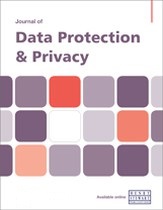Federated learning in healthcare: Addressing AI challenges and operational realities under the GDPR
Abstract
The fundamental characteristic of machine learning (ML) algorithms is their ability to learn to solve problems autonomously, based solely on the data provided to them; to do so, ML models require a huge amount of data (ie training data) to learn how to solve the problems they are subjected to. When talking about the training of artificial intelligence (AI) algorithms, especially for healthcare use, the matter of personal data included in the training datasets cannot be ignored. This includes data belonging to ‘special categories’ (including ‘health data’), which require more robust measures than those put in place for processing of so-called ‘common data’ in order to be processed under the General Data Protection Regulation (GDPR). Among those in the healthcare sector who develop or use AI, this issue is highly relevant. Federated learning is a cooperative ML technique capable of exploiting the knowledge stored in multiple datasets without the need to pool them out, as an innovative approach to privacy-preserving AI model training. In particular, in the healthcare sector, this technique can be used to enable multiple organisations to collaborate without sharing sensitive patient data. The aim of this paper is to showcase how federated learning integrates seamlessly with existing healthcare IT systems to address privacy concerns by presenting use cases that offer a concrete perspective on federated learning’s potential and operational challenge.
The full article is available to subscribers to the journal.
Author's Biography
Federico Vota is Data Protection Officer (DPO) and Data Protection Manager at Dedalus UK and Ireland, a leading multinational company in the health-tech sector. Federico is a lawyer specialising in data protection and new technology law, ensuring compliance with data protection regulations and managing legal matters related to innovation for the group’s entities based in the UK, Ireland, Australia and New Zealand. In particular, he also holds the role of DPO for the group’s UK entities, ensuring that personal data-processing activities comply with applicable regulations and acting as the point of contact with the supervisory authority. Previously, he gained significant experience in legal consulting, collaborating with prominent international law firms, where he refined his expertise in IT law and new technologies.
Francesca Pediconi is a Privacy Specialist at Dedalus Italia S.p.A., where she is in charge of corporate compliance with data protection regulations, with particular attention to GDPR. She supports the implementation of internal data protection policies and procedures, collaborating with various teams to integrate privacy principles into the company’s reality. Francesca graduated in law and gained solid professional experience in law and notary firms, specialising in contract law and data protection, with a broad expertise also in real estate and succession law. Over time, she has explored the legal implications of emerging technologies, with a focus on data governance. This background has allowed her to develop an interdisciplinary vision, combining legal and regulatory expertise to address the challenges of digitisation and data protection in different contexts.
Alessandro Liscio is a Data Scientist specialising in natural language processing (NLP) and machine learning (ML), with a focus on healthcare applications. He has experience developing AI-driven solutions to support decision-making processes and optimise workflows. His work spans clinical data processing, predictive modelling and NLP-based automation. Previously, Alessandro worked as a Machine Learning Engineer, applying deep learning and NLP techniques to various data-driven challenges. Alessandro holds a Master’s degree in artificial intelligence from the University of Bologna and a Bachelor’s degree in computer science from the University of Camerino. He has contributed to research through publications in artificial intelligence in medicine and presentations at international conferences. Alessandro is passionate about advancing AI research and exploring its potential to address complex scientific and technological challenges.
